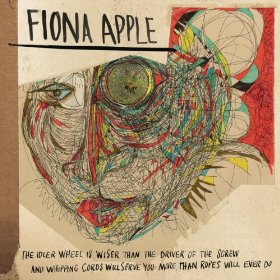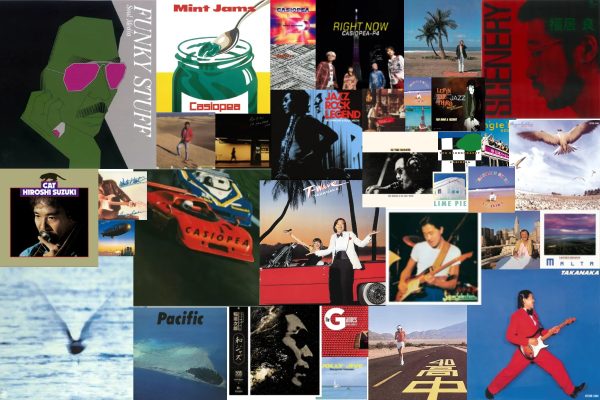The Underrated Art of Album Titling
Album covers get a lot of shine, and rightfully so. Images on the front of records can bring listeners to a record they never would have otherwise considered, and the covers of some of the greatest albums of all time, like “Abbey Road” and “Thriller,” have become in the public consciousness just as iconic as the music they were made to represent.
Album titles, though, are more sparingly discussed. Titles, just like covers, can go a long way to enhance the music they represent.
But only good titles can enhance their album. Honestly, at some level, the music speaks for itself, so a bad title doesn’t ruin an album as much as it serves as a nonfactor in its quality. (This is not, however, always the case, as we can get into later.)
But what are the qualities of an album title, and what makes one good? I, the foremost expert on the topic of album titling that I’m aware of, will demonstrate.
Ground Rules
I am not completely omniscient, nor am I completely free of musical context. There may be some meanings to albums that I am not aware of, and there may be some that I know, but most listeners wouldn’t. So, most of these points are completely subjective, and you may think differently based on your experiences and knowledge.
Unfortunately, that doesn’t matter. My word is law. If you find yourself disagreeing with any of my points, or think a title that I don’t like is remotely decent, you are wrong. This also applies to all of my other published op-eds.
Also, I judge primarily the official title of the album. Some records have alternate versions of their title on their cover, but that is not what is being judged here. I will make some exceptions for albums that bring forth a colloquial name that is used more than the actual name of the album, but the original title is still incredibly important.
Stating the Thesis
This is, at its most basic, what all album titles should do. In other words, the default assumption most people make when they read the title of the album is that the title in some way reflects the music that you hear. When you see an album called “Murder Ballads,” you expect it to be dark.
Importantly, the “thesis” can refer to the lyrics of the album or the music itself, but the best titles do both. (Obviously, music without lyrics is more difficult to quantify in respect to the thesis.) Usually, any thesis-stating title refers to the lyrics of the record, and qualities of the music apart from the lyrics aren’t the primary focus.
For example, Pink Floyd’s “The Wall” is named specifically after its main concept, that of a metaphorical wall that its main character builds to shield himself from the world. This title, though, reveals nothing about the content of the music. Perhaps the idea of a wall is not one conducive to a necessarily happy album, but is a listener even taking a specific mood from such a short phrase before listening to an album? “The Wall” thus is a mediocre title, because while it is straight to the point, it’s not particularly interesting.
Compare “The Wall” to a better-titled record from 1979, Talking Heads’ “Fear of Music.” Fear and paranoia are fundamental parts of the lyrics of “Fear of Music,” but, again, that doesn’t qualify it to have a good title. What takes it over the top is the franticness of the music, and how the entire album expresses a level of stress outside of the lyrics, therefore making “Fear of Music” a poignant label for the mood of the record. The album really does seem to exude enough paranoia as to be afraid of itself.
Talking Heads followed up “Fear of Music” with another excellently-titled album, “Remain in Light.” This title speaks more to the flow of the album, which largely reflects the thesis of the record, trying to stay out of the darkness and escape the difficulties of everyday life. The music seems to be trying to stay alive, as the tracks become slower near the end of the record, where it seems that the band couldn’t “Remain in Light” any longer, ending with the haunting “The Overload.”
But, to be honest, the pure relevance of the title isn’t the most important part. More abstract ways of looking at titles are probably more helpful in discovering what’s good and what’s not.
Uniqueness
This is probably the most important part of any title. Something can be as relevant as it wants, but if it doesn’t distinguish itself, what’s the point?
Uniqueness is near the related concept of Googleability, where a title must be both novel and distinguishable. If you have to insert the word “album” at the end of any Google search to find a specific record, it loses points. (There is no actual defined point system here because, again, I have appointed myself judge, jury, executioner, and God regarding this topic, and therefore will do as I like.) I like the concept of naming and creating albums based on US states, but Googling Michigan or Illinois will not bring forth results about Sufjan Stevens albums. (If Stevens had instead named the latter “Come on feel the Illinoise,” as is written on its cover, we’d be having a different conversation.
A critical part of uniqueness is using evocative language absent of overly common words. One of my favorite bands, Black Country, New Road, has issues with this. (They also have a terrible and tedious-to-say band name, but that’s a completely different topic.) Their debut, “For the First Time,” is chalked full of words that don’t evoke much of anything, and their follow-up, “Ants from Up There,” has the same problem, with the added problem that it doesn’t really mean anything.
On the opposite end, there’s the world’s best Slint tribute act, black midi. (That’s a reference for all the cool folks out there.) Their newest album, “Cavalcade,” isn’t the most Googleable, but it does stick in the mind, as does their debut, “Schlagenheim.” “Cavalcade” also reflects the overwhelming nature of that album, and while I haven’t gleaned any meaning from the word “Schlagenheim,” I give it a pass due to The Cool Factor, which I will discuss further later in this piece.
Capitalization and Punctuation
My general thoughts on the first two are that they should be used more. It’s pretty simple to make your title more interesting by manipulating capitalization and punctuation.
Jeff Rosenstock’s “WORRY.” is a good example of using capitalization to emphasize the main concept of the album, and Gang of Four’s “Entertainment!” uses its punctuation ironically, as the lyrical content of the album is quite negative and narcissistic. It isn’t really supposed to be seen as empty entertainment.
Punctuation and capitalization can also just be used to make titles weirder, which is a significant plus. “’Allelujah! Don’t Bend! Ascend!” is a good example, as are “‘Heroes’” (to be clear, that album features quotes around its title, but AP style also includes quotes around album names) and “good kid, m.A.A.d city.” These albums all have their own reasons for those changes in form, obviously, but I’m mostly concerned here with how it makes them stand out.
As a final note, exclamation marks are the best kind of punctuation to use. I’ve already mentioned a couple of examples of that, but “Wide Awake!” and “Quarters!” are also both improved simply by virtue of the exclamation mark.
Wordiness
I have a basic rule regarding this, which states that an album can be as long and unseemly as it likes, as long as it can be easily abbreviated, and acronyms don’t count.
While I like “My Beautiful Dark Twisted Fantasy” as a title on its own, it violates this rule. If you want to abbreviate it, you have to say “MBDTF,” which is not just an acronym, but a completely unpronounceable acronym. The same goes for “The Black Saint and the Sinner Lady,” another evocative title that just takes way too much time to say.
Some albums can be abbreviated, but even that abbreviation doesn’t eradicate all the wordiness, like changing “Lift Your Skinny Fists Like Antennas to Heaven” to “Lift Your Skinny Fists.” It’s better, but it’s not great.
Occasionally, though, titles can be abbreviated to a perfect length, so much so that their original title becomes obsolete. The album known to most as “Ziggy Stardust” is, in actuality, called “The Rise and Fall of Ziggy Stardust and the Spiders from Mars,” but the abbreviation sounds so good and is so handy that the actual title is largely forgotten. The same can be said for “Sgt. Pepper’s Lonely Hearts Club Band,” known colloquially as just “Sergeant Pepper’s.”
Cleverness
“Cleverness” is very much in the eye of the beholder, and there aren’t exactly any criteria that I’m going to set forth, but I just like it when an album does something interesting with its title. Again, it’s hard to quantify exactly, but this generally means there’s some reference to something outside of the context of the album.
Perhaps my favorite example of cleverness is in the one-hit wonders Evan and Jaron, who named their debut album “We’ve Never Heard of You Either.” Good stuff.
I also like Björk’s “Debut,” although that could have been even more clever had it not been her actual debut album.
“Who’s Next” also fits in this category, as it serves as a double entendre, both taunting all challengers to the Who and declaring that they are still the next big thing. (This, admittedly, might be reading too far into the title, but whatever.) I also love “The Who Sell Out,” which ties into the advertisements featured on the album’s cover art and the fake radio ads interspersed between the songs themselves.
Bob Dylan’s “Blood on the Tracks” is another double entendre, presenting an evocative image of Americana in its depiction of blood on train tracks, but it also refers to the pain (blood) present in the songs (tracks).
Another name I might be reading too much into is “Thick as a Brick,” which is an album featuring nonsensical but vaguely epic-sounding lyrics. When you first listen to the lyrics, you get the feeling that the words probably make sense as a whole, but in fact they were intentionally written to be otherwise. “Thick as a Brick” is a British phrase essentially meaning “incredibly dumb,” but if you think about it, that doesn’t fully track, either. Is a brick really that thick? The phrase, though, sounds good and rhymes, despite not making a ton of sense, just like the lyrics to the album.
The Cool Factor
This is the most unquantifiable aspect of a title, and also the one that makes all the others completely meaningless. If it just sounds cool, nothing else can really matter that much. I’m not even going to attempt to elaborate on why things are cool, because I don’t even know. Instead, here’s a list of 20 albums that have The Cool Factor. Not all of these have exclusively The Cool Factor to thank for how good their names are, but it is probably the most significant part. They just sound good.
- “Bringing It All Back Home”
- “The Freewheelin’ Bob Dylan”
- “Songs for the Deaf”
- “Atrocity Exhibition”
- “Fresh Fruit for Rotting Vegetables”
- “Fetch the Bolt Cutters”
- “Head Hunters”
- “Turn On the Bright Lights”
- “Psychocandy”
- “Polygondwanaland”
- “I’m in Your Mind Fuzz”
- “The Miseducation of Lauryn Hill”
- “Let Love In”
- “Aquemini”
- “The Final Cut”
- “Hail to the Thief”
- “In Rainbows”
- “Your Queen Is a Reptile”
- “Bone Machine”
- “The Low End Theory”
Self-Titled
The self-titled album is a cliché at this point. There are countless self-titled albums out there, and I’m generally apathetic towards them. If you want to make your name the only prominent thing on your debut album, more power to you.
There are more interesting variations than the self-titled debut, though. There’s “Talking Heads ‘77,” which adds something extra onto the title, as does “An Evening with Silk Sonic.”
In general, I’m not a fan of making a series of self-titled albums, like Weezer and Led Zeppelin have done, mostly because neither of those bands had the courage to make their titles just the band’s name. Adding numbers or colors is lazy. At least if “Weezer (Green Album)” were just called “Weezer” on all platforms, the band would be charming in their belligerence. And however much I love “Led Zeppelin IV,” it would be better with an actual title.
What I’m a huge fan of, though, is releasing your self-titled album after you’ve already become the most famous band in the world, and then people know it by a completely different name. I’m referring, of course, to “The Beatles,” better known as “The White Album.” It’s just such a weird thing to do, and I love it for that.
The Unjudgable
There are some titles that just can’t be viewed without bias. Some titles have become so famous and so iconic that trying to define them as good or bad is a useless proposition.
I mentioned “Abbey Road” and “Thriller” earlier, and, you know, they’re “Abbey Road” and “Thriller.” I mean, I guess “Abbey Road” doesn’t really mean anything, and it doesn’t really have The Cool Factor, but I can’t seriously say it’s bad, because it’s just so famous.
The same goes for “To Pimp a Butterfly,” the ubiquity of which doesn’t allow me to see if it’s genius or idiotic, and “The Dark Side of the Moon,” a name which is so directly tied to an image that I can’t tell if the name is good or the name is meaningless and the album cover is just so great.
“Purple Rain?” What does “Purple Rain” mean? I don’t know, I guess it’s got The Cool Factor, but apart from that, I just hear that guitar solo in my head.
This is all a long-winded way of saying that these titles confuse me, and the music they represent is just too darn famous to view the title in isolation. It’s a glitch in the system, but what can I say?
The Audacious
These are my favorites. Some albums just decide to go above and beyond in how much they break the rules. Just what can an album title be?
The tamest entry in this collection is probably “We got it from Here… Thank You 4 Your service.” It’s just got a lot of little things going for it. It’s got weird punctuation, it’s got weird capitalization, with no conceivable pattern, it’s got the number “4” instead of the word “for,” as if Prince wrote it.
Speaking of Prince, he made an album called “[Love Symbol].” At least, that’s what it’s called on Spotify. In actuality, it is called the image to the right of this bit of text, but you literally can’t type it, because it is just a symbol Prince created himself. This is Ungoogleability into overdrive. You can’t really even pronounce the name of the album unless you say “Love Symbol,” which is more describing than pronouncing in the first place.
There’s also “F♯ A♯ ∞,” pronounced “F-sharp, A-sharp, infinity,” which breaches the limits of what is pronounceable without a Google search, and even then it’s awkward to type in.
The most unseemingly thing you can do with a self-titled album is to make two self-titled albums that don’t have the same title and release them within two years of each other. “The Velvet Underground & Nico” was released in 1967, and “The Velvet Underground” was released in 1969. “The Velvet Underground” can’t really be easily shortened, so the best way to describe either album is to say the full name of the album, and you can’t even say “self-titled” because there are two of them, and even if you say the full name “The Velvet Underground,” it may seem like you’re just talking about the band, because the other self-titled album (“The Velvet Underground & Nico) is more famous and less people know about the later one! It’s so unwieldy I have to respect it. The logical solution is to call them “the banana one” and “the one with ‘Pale Blue Eyes,’” which is just so beautifully stupid.
Fiona Apple’s 1999 album is generally called “When the Pawn…” The ellipses in that title have a purpose, as the album is technically titled as follows:
When the pawn hits the conflicts he thinks like a king
What he knows throws the blows when he goes to the fight
And he’ll win the whole thing ‘fore he enters the ring
There’s no body to batter when your mind is your might
So when you go solo, you hold your own hand
And remember that depth is the greatest of heights
And if you know where you stand, then you know where to land
And if you fall it won’t matter, cuz you’ll know that you’re right
However, I’m tempted not to give Apple credit for that one because of how little that name is displayed. The cover of the album features only the first three words, and Spotify, Pitchfork, and Rate Your Music all designate the album as “When the Pawn…” or “When the Pawn.”
However, not one to disappoint my op-eds, Fiona Apple came back in 2012 to release “The Idler Wheel Is Wiser Than the Driver of the Screw and Whipping Cords Will Serve You More Than Ropes Will Ever Do,” which, while not as long as her 20th-century effort, is recognized by that title on most platforms, including Spotify, Pitchfork, and Rate Your Music. It too, can be abbreviated to just “The Idler Wheel…,” but I’m glad it usually isn’t.
The Greatest Monstrosity Known to Man, Brought to You by One Mr. Fred Durst

Limp Bizkit was possibly the gaudiest monstrosity of a band ever to exist (although, technically they do still exist) and at the forefront of nu metal, the gaudiest monstrosity of a genre ever to get popular (and I mean none of that in a good way), so it’s only fitting that they gave us the gaudiest monstrosity of an album title of all time. “Chocolate Starfish and the Hot Dog Flavored Water.” At the risk of permanently damaging the mental state of anyone who’s read this long, I have attached a picture of the album cover.
If anything were to prove that an album’s title mattered, or that an album’s cover mattered, or that anything mattered, it would be this. It shouldn’t have gotten off the ground.
It went platinum six times.
Nothing matters.
Your donation will support the student journalists of Chamblee High School Blue & Gold. Your contribution will allow us to print editions of our work and cover our annual website hosting costs. Currently, we are working to fund a Halloween satire edition.

Thomas Rice is a senior, and this is his second year on the staff. In five years he hopes to be celebrating a Hawks NBA Finals victory after graduating college. The movie that would best encapsulate his Chamblee experience is "Tall Girl", except instead of “Girl” it’s “Boy” and instead of being about himself it’s about Blue & Gold staff writer Adam Pohl.







